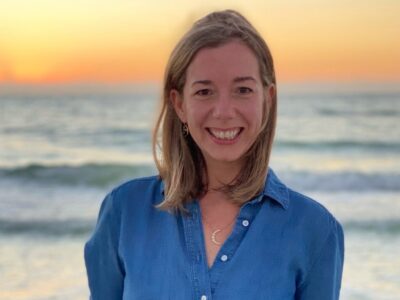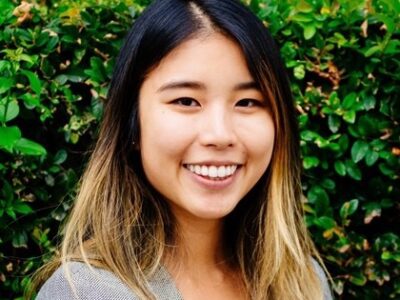
Mahak Agrawal is a proven leader in the sustainability space. An alumna of the Master of Public Administration in Environmental Science and Policy (MPA-ESP) program, Mahak currently works at Columbia’s Center on Global Energy Policy on the Carbon Management Research Initiative. She has extensive training as an urban planner and also works with the Switzerland-based International Tunnelling and Underground Space Association (ITA) to encourage sustainable subsurface development. Prior to attending Columbia, Mahak earned her first master’s degree specializing in urban affairs from the School of Planning and Architecture, New Delhi.
Recognized for her achievements accelerating the Sustainable Development Goals (SDGs) in India through clean water and sanitation initiatives, Mahak was nominated for the 2021 Goalkeepers Global Goals Award, led by the Bill and Melinda Gates Foundation. Mahak has also worked in various capacities with the International Society of City and Regional Planners; the Intergovernmental Panel on Climate Change, Town and Country Planning Organization, Government of India; and the Institute of Transport Economics, Oslo, among others.
Two years ago, she founded The Spatial Perspectives as a platform to change the way we view pressing urban-regional challenges. In her spare time, Mahak experiments with sustainable artworks showcasing the cultural heritage of India alongside global environmental narratives. Presently, she is exploring the power of art therapy with her mum who is recovering from COVID.
In the interview below, Mahak elaborates on her time at Columbia, discusses her career path in sustainability, and provides advice to current students.
What inspired you to earn your Master of Public Administration in Environmental Science and Policy (MPA-ESP) from Columbia?
It was not a straight route to Columbia MPA-ESP. The reason I say that is because I was trained in urban planning and sustainable development, and I was working in that domain for more than four years before coming to Columbia. While working, I was hoping to pursue a doctoral degree at the intersection of climate science and urban sustainable development, but destiny had it I was offered a Master’s in Public Policy at the University of Oxford and a Master’s of Public Administration in Environmental Science and Policy at Columbia.
There are two key reasons that pushed me to pursue MPA-ESP at Columbia while the world was in a lockdown situation. One, the MPA-ESP is a STEM degree, and that was a very big plus for me. The second reason was that I was offered two fellowships because of my prior work on sustainable development, which made the journey much, much easier to pursue in terms of finances. So, I would say that there were multiple reasons that eventually led me to Columbia.
What skills did you develop through the program? How have these translated to your professional life?
I think one of the most significant skills I gained is understanding how public policies are actually developed at the federal level. That was really a significant learning opportunity for me. Going through a 3-semester program at Columbia and seeing through the various workshops how a bill might affect people and how we can actually affect change when it comes to public policy or administration, that was a really wonderful opportunity for me. In my prior experience, I was working more on the side of implementing public policy, so I knew how federal and international policies were affecting communities and nations around the world. Getting to know which stakeholders actually affect a federal policy before implementation was an important learning moment that I am able to translate into my professional life as well.
What most interests you about the sustainability field?
For me, sustainability has always been a very personal cause and the reason I say that is because my dad works for the public service in India. Growing up, there were supposed to be days where you bring your child to work so they can see what their parents do. My dad was not bringing me to the office and making me sit there just to see what he does. He was taking me out into the field. I was able to witness him interacting with people and with different officials as to how development policies really play out on the ground, what people get affected by public policies, and how government institutions play a part at different levels. So for me, closely witnessing how development policies – or any policies – impact the society and the environment was something that I could never forget. It’s the reason that I have always been driven to do something positive for society and the environment and to be somebody who is making change in the sustainability space.
What is your ideal career?
My ideal career changes from time to time in terms of the specific company that I want to work for. One of my dream careers would be working in the sustainability or social impact domain within the tech industry. There is a huge untapped potential that tech can play in actually driving positive change, not for the environment only, but for society and government institutions all around the world. So whenever we talk about carbon management or ESG-aligned corporate governance, I think tech industries have abundant resources to drive and deliver significant change. Ultimately, that would be an ideal career because I could be a part of that change — being a sustainability ninja in the tech industry.
What advice would you give to current students?
I think students should consider that there are different avenues when it comes to environmental science or policy. There are alternative ways of navigating the landscape besides the government, private sector, and nonprofit categorizations. You need to think beyond those types of organizations to your interests, whether you want to go into sustainable art or energy or urban development. There are a lot of things that are moving toward sustainable development as well as toward environmental science and policy. Sustainable investment practically flows into every fire. I think students need to keep their search net pretty wide when it comes to job opportunities.
I wish I did not pay as much attention to the job search because MPA-ESP is just a one-year program. Of course, you need to search for a job, especially if you are an international student who wants to work in the US and has a mind-numbing time clock attached to your visa. Looking back, I would have rather allocated most of the time spent searching for a job toward participating in activities around campus, especially if I were to relive it now since class is not all remote. So enjoy it, cherish it, and make good connections with your friends and not just in a networking sense.
You can follow Mahak’s journey on LinkedIn, Twitter, and Instagram.



